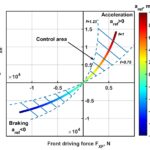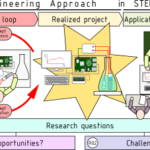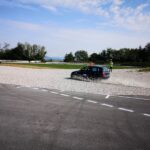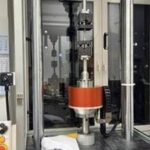Mechanisms analysis and synthesis (3064), Level 1 PSP, Year 3
The course takes place in the 3rd year of the PSP study (Level 1) – the SOV-MT field of study. It includes 30 hours of lectures and 30 hours of lab work, together accounting for 4 credit points (ECTS).
The students of the Faculty of Mechanical Engineering can access all materials and additional information on the course in the online classroom of the course Mechanisms.
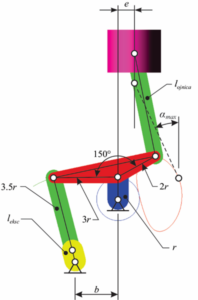
The course covers the general principles of the analysis and synthesis of mechanisms whereby the students are introduced to basic terminology of the theory of mechanisms, principles of operation and implementation of the most common mechanism types, they become familiar with the theoretical basis for efficient analysis and design of mechanisms as well as the use of purpose-developed software tools. The lectures first cover the theory of mechanisms with the emphasis on the definition and function of mechanisms or a system of constrained bodies (structure, mechanism, machine), kinematic chains and joints, degrees of freedom, planar and spatial motion, inversions as well as classification of mechanisms and principles of their operation and implementation. The course also covers the kinematics of mechanisms, instantaneous centre of zero velocity and instantaneous centre of zero acceleration, theorems in the kinematics of mechanisms, kinetics of the mechanisms (loads and energy transmission), analysis of operation for basic mechanism types (four-bar, crank-slider), cam-follower mechanisms (implementation, function, analysis of operation and design requirements), the design process and synthesis of basic-type mechanisms and mechanisms with elastic elements. The lab work, however, is focused on the application of numeric simulations for the analysis of mechanism operation. The students gain the knowledge to solve average problems in the design, analysis and optimisation of mechanisms.
The covered topics are presented in the textbook entitled Analiza in sinteza mehanizmov (Mechanisms analysis and synthesis).
Vehicles (3067), Level 1 PSP, Year 3
The course takes place in the 3rd year of the PSP study (Level 1) – the SOV-MT field of study. It includes 30 hours of lectures and 30 hours of lab work, together accounting for 4 credit points (ECTS).
The students of the Faculty of Mechanical Engineering can access all materials and additional information on the course in the online classroom of the course Vehicles.

The course covers vehicles as a mechatronic system which is part of the human-vehicle-roadway system. The course mainly covers the operation of vehicles and the maintenance process. Emphasis is placed on the specific features of various vehicles and the environment in which they operate. The students become familiar with vehicle assemblies, their functionality, their importance for the function of a vehicle as well as for the safety and reliability of its operation. The course covers the following topics: driving resistance, the basics of drive systems and the balance of forces and power, longitudinal and transverse dynamics, vehicle suspension, steering systems, braking systems, the basics of passive and active safety, the basics of electric and hybrid propulsion systems. The course consists of lectures and lab work. The lectures first cover the theoretical basis of vehicles and vehicle systems. The gained knowledge is then applied in the calculations of vehicle characteristics and vehicle systems. The laboratory classes consist of laboratory work and field work. The field work enables the students to become familiar with real-life problems in the field of vehicles and use the gained knowledge and literature to find solutions.
The covered topics are presented in the textbook entitled Vozila (Vehicles), which is also available online at the Repository of the University of Ljubljana.
Traffic logistics (3069), Level 1 PSP, Year 3
The course takes place in the 3rd year of the PSP study (Level 1) – the SOV-TDS field of study. It includes 30 hours of lectures and 30 hours of lab work as well as 65 hours of student’s independent work, altogether accounting for 5 credit points (ECTS).
The students of the Faculty of Mechanical Engineering can access all materials and additional information on the course in the online classroom of the course Traffic logistics.
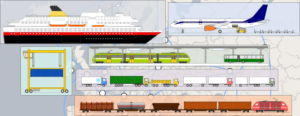
The main objective of this course is to introduce the students to the basics of the logistics of the land, waterborne and air transport with the emphasis on the road transport. The course covers technical solutions of transport vehicles and their equipment, technical solutions of road infrastructure and information systems of transport and storage. The course also covers categorisation of vehicles into different groups based on their main characteristics. Road transport vehicles and their systems are covered in more detail. The course includes lectures and lab work. The lectures first cover the theoretical basis of logistic systems. The gained knowledge is then applied in the use of logistic methods in the road transport. The laboratory classes consist of field work and project assignment. The field work enables the students to become familiar with real-life problems in the field of traffic logistics and the existing solutions. The main objective of the project assignment is to apply the gained knowledge and literature to find solutions to real-life problems.
The covered topics are presented in the textbook entitled Logistika prometa (Traffic logistics), which is also available online at the Repository of the University of Ljubljana.
Technical drawing (3006-V), Level 1 PSP, Year 1
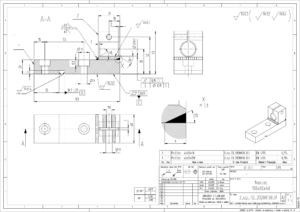
The course takes place in the 1st year of the PSP study (Level 1). It includes 30 hours of lectures and 30 hours of lab work together as well as 40 hours of student’s independent work, altogether accounting for 4 credit points (ECTS).
The students of the Faculty of Mechanical Engineering can access all materials and additional information on the course in the online classroom of the course Technical drawing.
The course introduces the principles of technical drawing in accordance with Slovene (SIST) and international ISO standards. The students are not only required to know the rules for technical drawing but also to complete a project assignment within the framework of which they are expected to produce technical documentation of an assembly.
Technical drawing and computer-aided modelling of geometry (2005-U), Level 1 ASP, Year 1
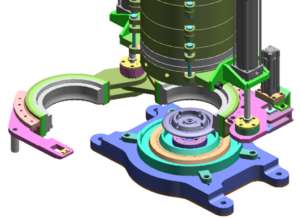
The course takes place in the 1st year of the ASP study (Level 1). It includes 45 hours of lectures, 30 hours of lab work and 50 hours of student’s independent work, altogether accounting for 5 credit points (ECTS).
The students of the Faculty of Mechanical Engineering can access all materials and additional information on the course in the online classroom of the course Technical drawing and computer-aided modelling of geometry.
The course introduces the principles of technical drawing in accordance with Slovene (SIST) and international ISO standards. The students must demonstrate not only basic understanding of the technical drawing rules but also knowledge on how to use a modelling software tool to create geometric 3D models and technical documentation.
Research in mechanical engineering, Level 1, PSP, Year 3
The course takes place in the 3rd year of the PSP study (Level 1). It includes 90 hours of lectures and 90 hours of lab work, altogether accounting for 15 credit points (ECTS).
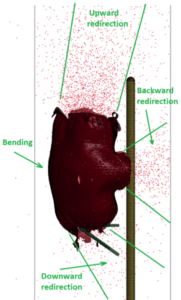
The Chair of Modelling in Engineering Sciences and Medicine contributes to the course in the following interdisciplinary research fields:
1. Material characterization and development of material models,
2. Special development know-how,
3. Biomechanics and
4. Traffic safety and information technology.
The main objective of this course is to introduce the students to the aforementioned research fields and the interconnection between them. The course enables the students to do research in a selected research field and present their ideas and findings in their master’s thesis. Individual fields of research are complementary and have synergistic effects between the industrial, academic and research environment and public institutions.
The lessons take place in a laboratory where the students can participate in the development and application of new skills and methods of numerical evaluation, analyses and measurements of technical systems in various fields of engineering sciences and medicine (design and optimisation of structures and objects to improve traffic safety, development of models to predict the stress-strain state and lifetime of objects made from advanced materials and structures, soft tissue characterisation by taking into account the impact of the muscle response on their injuries, development of human-body models, blast and ballistic protection, vehicle kinematics and dynamics, traffic infrastructure, traffic information technology, measurements and validation).



